Why Does My Car Make a Groaning or Grinding Noise When Braking Despite Having Fine Pads?
A warped brake rotor making uneven contact is the most common reason for the groaning or grinding noise when braking, even with fine brake pads. Other things causing grinding noises when braking are worn-out wheel bearings, dirt or debris built up on the brakes, low-quality aftermarket brake pads not matching the sizes from the maker, or a sticking or broken brake caliper pin. These issues can come from heat, regular use over time, or wrong sizes and materials.
The brakes make a grinding noise when you press them. But then you look and see the brake pads are okay. This happens to many people. It can be hard to find what is causing the noise.
Here I will talk about all the things that could make the grinding noise from the brakes even if the brake pads look fine.
For your convenience, I’ve designed an interactive tool that assists in diagnosing car troubles. It takes you through straightforward steps. Be sure to explore it.
Are you facing the problem of groaning noise when braking at low speed? You can read my guide on that topic to learn more.
- Grinding noise when braking can happen even if brake pads look fine. This indicates other issues like rotor scoring, glazing, bad bedding, etc.
- Dirt and debris getting between brake pad and rotor is a common cause of grinding. Cleaning can fix it.
- Worn brake pads can have the backing plate scraping the rotor. Time to replace pads.
- Scoring or rust on rotors creates uneven surface, causing grinding. Cleaning or replacing rotors may be needed.
- Overheated and glazed pads reduce braking power. Sanding and bedding in new pads helps.
- Improper bedding of new pads/rotors leaves surfaces uneven. Follow proper bedding-in steps.
- Cheap aftermarket pads of wrong size cause poor fit, rapid wear, grinding. Stick to OEM spec pads.
- Sticky brake caliper pins prevent pad movement, causing grinding. Clean and lubricate pins.
- Loose or corroded caliper bolts allow movement and noise. Inspect and replace bolts.
- Bent backing plates contact and grind rotors. Inspect and adjust if needed.
- Damaged wheel bearings cause grinding from bearing wear. Inspect and replace if bad.
What is My Personal Experience With Grinding Noise When Braking?
Once, my 2010 Honda Civic started making this godawful grinding sound whenever I’d apply the brakes. I inspected the pads and rotors closely but couldn’t see anything wrong. After some forums research, I cleaned the caliper slides and pins thoroughly and lubricated them properly. That fixed it!
Apparently all the trapped brake dust had made the caliper hardware sticky, preventing full pad/rotor contact. Maintenance matters—I’ve been sure to keep those components clean ever since.
Causes Of Grinding Noise When Braking But Pads Are Fine
Here are some of the most possible causes of grinding or groaning noise when braking despite good brake pads:
1. Dirt Between Brake Pads and Rotor
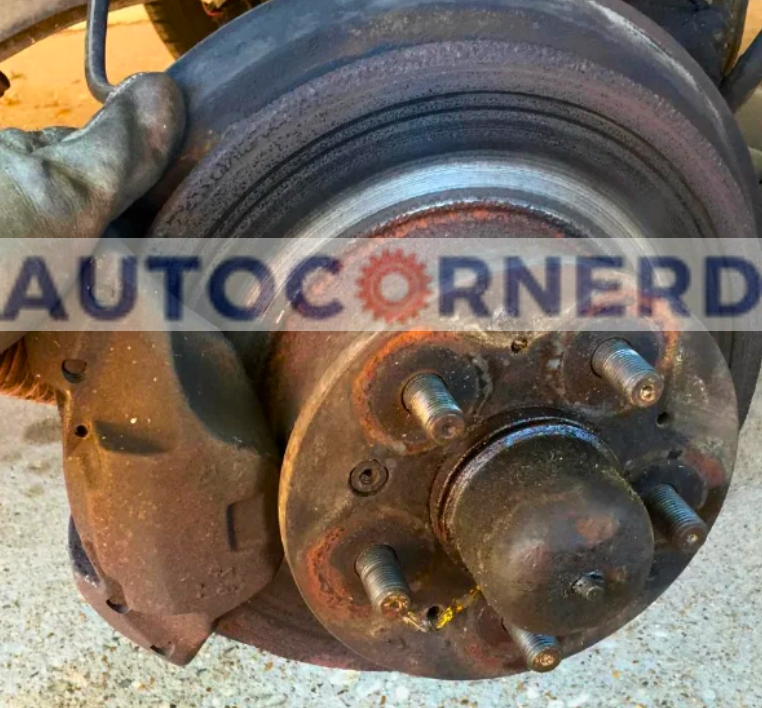
When the brake pads meet the brake rotor, the contact between the two parts creates friction, which produces the braking power.
But, when dirt and grime get between the brake pads and the brake rotor, it can cause the two parts to rub together, resulting in a grinding noise.
Dirt can get between the brake pad and rotor can result from driving in areas with a lot of gravel, mud, and dirt.
When the brakes are applied, the material can get stuck between the pad and the rotor. Other times, it can be from improper brake pad installation or from contamination of brake fluid.
In addition, if your car has been through a deep puddle, the muddy water can get between the pads and rotors and cause the same grinding noise.
How to clean dirt between brake rotor and pads to fix grinding noise?
If there is just dirt between the brake pads and the rotor, all you need to do is to clean the brake rotor. The best way to clean brake rotors is to use rubbing alcohol on a towel. You can also use CRC brake cleaner to clean the brake rotor.
2. Wear Tab Is Scraping The Rotor
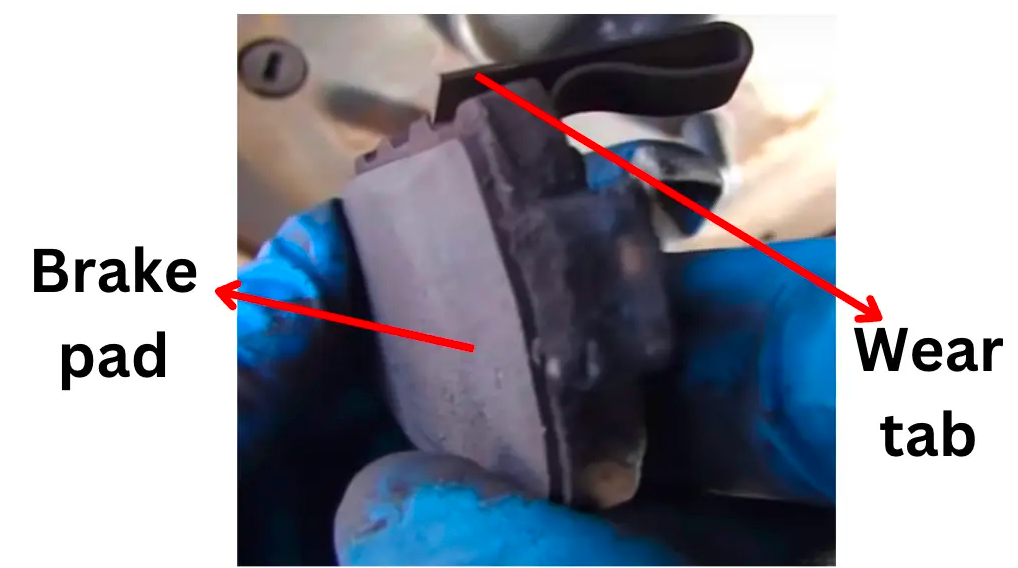
The brake pads have three main parts: a metal backing plate, a friction pad, and a wear marker.
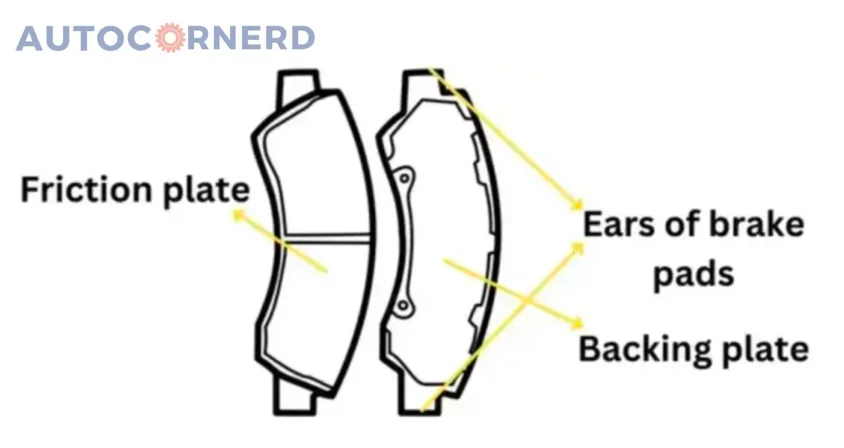
The metal plate keeps the brake pad steady on the brake caliper. The friction pad makes the rubbing that’s needed to slow down and stop your car.
You’ll often hear a grinding noise when the brakes are making metal-to-metal contact. If the brake pads look fine, they’ve likely worn down evenly to where the wear tab on the brake pad scrapes. That’s the sign that the brake pads need swapping out.
How to fix things?
The brake pads should get replaced when they’ve worn thinner than the backing plate. The smallest thickness for the wear pads is 3 to 4mm. After that point, it’s time to put in new brake pads.
3. Scoring or Corrosion on the Brake Rotor
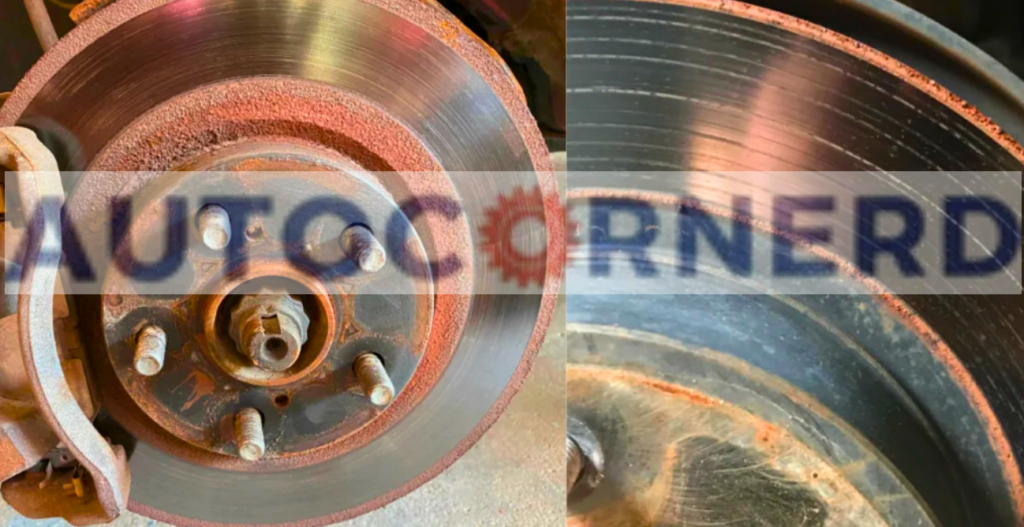
The brake rotors can make grinding noises when they are scored. Scoring means the smooth part of the rotor gets rough and uneven from use.
When the rough scored rotors touch the brake pads, it makes grinding or groaning sound. Bad scoring makes the brakes work worse too.
Rust and corrosion also cause grind sounds. Rotors get rust if water touches them. The rusty rotors then grind the brake pads.
Lots of rust wears the brake pads quicker too. So the car has trouble fully stopping.
Warping bends rotors too. It happens from the heat of hard braking or hot drives.
Warped rotors make uneven contact spots. Those spots grind the brake pads. They also make the brakes shake and wobble.
How to fix?
Light rust comes off with a wire brush. Soak stubborn rust in vinegar. Wipe clean with CRC brake cleaner.
Sand heavy rust gently with 120 grit paper. Remember to fully clean when done.
Furthermore, you can also use Scotchbrite pad and rubbing alchohol to clean the brake rotors.
See if rotors have deep grooves from scoring. Carefully scrape with a fingernail. Catches mean replace.
You can’t see warped rotor damage. Shaky pedal and wheel mean warped. Must replace.
4. Brake Pads Are Glazed
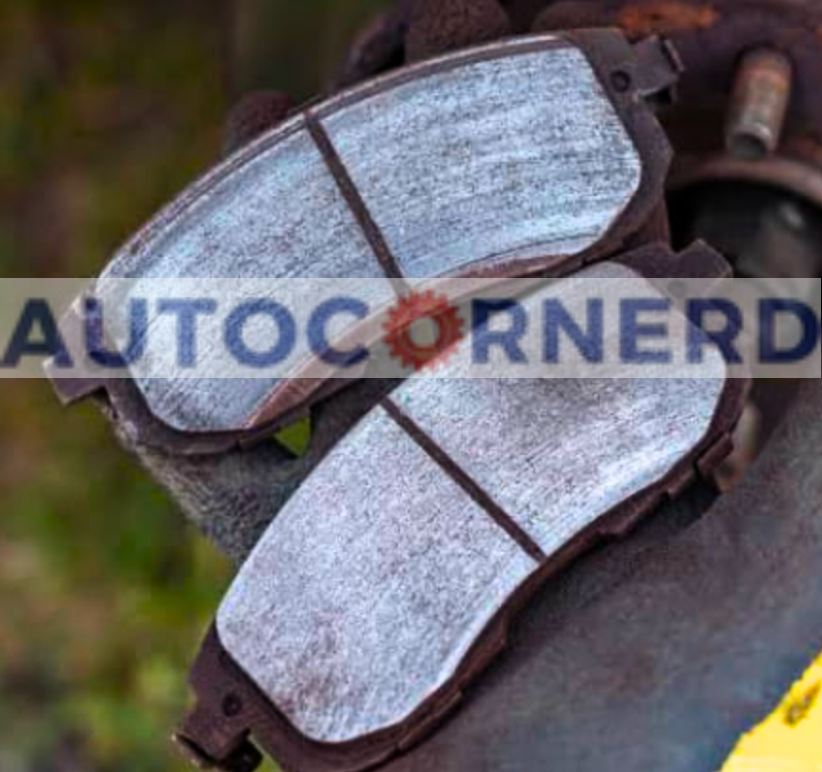
The shiny gloss on the brake pads is the most common cause of grinding brakes. But glossy doesn’t always mean bad brake pads.
The gloss happens when the pads get too hot – hotter than what the friction material can handle. This can happen if you apply the brakes a lot or use them hard over and over. Brake pads work best at certain temps.
Go past that and the binders and stuff in the brake pad start to melt and glaze over. This makes them worse at slowing your vehicle and causes the grind when you brake.
How to know if pads are glazed?
Glossy, shiny brake pads where they touch the rotor. Can also have little cracks on the surface. And the brake pedal will be really hard but not slow the vehicle much.
How to fix glazed brake pads that are causing grinding noises?
If brake pads are lightly glazed, first wet them with isopropyl alcohol and sand them with 280 to 320 grit sandpaper on a granite stone or concrete slab. You can also try scuffing brake pads on concrete sidewalks or asphalt surfaces to deglaze them.
However, I would advise you to just get new brake pads instead of going through this headache. This is because the brake rotor is quite expensive, and glazed brake pads can damage the brake rotor, which will become quite expensive to fix in the long run.
5. Brake Pads and Rotors Are Not Bedded Properly
The brake pads and rotors need to fit together nicely before you use them. This is called bedding the brakes. Bedding makes the pads and rotors very flat and smooth so the brakes work right.
If the bedding isn’t done right, the brake pads won’t fit the rotors perfectly. Then the brake pads wear unevenly. This can make the brakes groan when you use them.
New pads and rotors need bedding. Old pads and rotors need it too if you cleaned or scuffed them. Bedding helps them work their best.
To bed the brakes, press the brake pedal firmly but gently a few times in a row. Slow way down but don’t fully stop.
Here is how to bed the brakes:
Drive up to 60mph. Then slow down to 5mph by braking pretty hard but not fully stopping. Do this 10 times. This heats up the pads and rotors so they fit each other evenly. Don’t brake so hard that the ABS turns on. After 10 cycles, the brakes should feel smooth and quiet.
6. Noise Of Brake Pad Material
Brake pads come in the following materials:
- Organic
- Ceramic
- Semi-metallic
Ceramic brake pads are very quiet compared to other brake pad materials. Moreover, ceramic brake pads produce very little dust. However, ceramic brake pads are not suitable for high-performance or heavy towing vehicles. This is because ceramic brake pads cannot sustain the high heat levels that those vehicles require.
When the braking system is subjected to high heat due to harsh braking, ceramic brake pads can become glazed and damage the brake rotor. As a result, your vehicle will produce grinding noises when braking.
On the other hand, semi-metallic brake pads are not as durable as ceramic brake pads but are more heat-resistant and can handle a wide range of temperatures.
Semi-metallic brake pads have increased stopping power that can handle the higher pressure required by performance vehicles or heavy-towing vehicles.
However, semi-brake pads are noisiest compared to the other brake materials and produce most brake dust.
Furthermore, semi-metallic brake pads are more harsh on brake rotors. Due to this reason, semi-metallic brake pads are more prone to squealing and grinding noises.
7. Aftermarket Brake Pads With Improper Size
The cheaper brake pads may tempt you. But bad quality parts can bring troubles. They may not fit right, wear out fast, or harm the expensive brake rotor.
Wrong sized aftermarket brake pads make problems. First, noisy grinding while braking. This happens as the brake pads may not fit in the slots well. Or they are not the right thickness to handle the brake force.
The size and shape of brake pads matter for how your vehicle drives. If brake pads are too small, they won’t wear down evenly when braking.
If pads are too big and thick, they won’t fit the caliper slot. This quickly wears out pads and rotors. It makes braking worse and can damage them.
8. Sticky Brake Caliper Pins
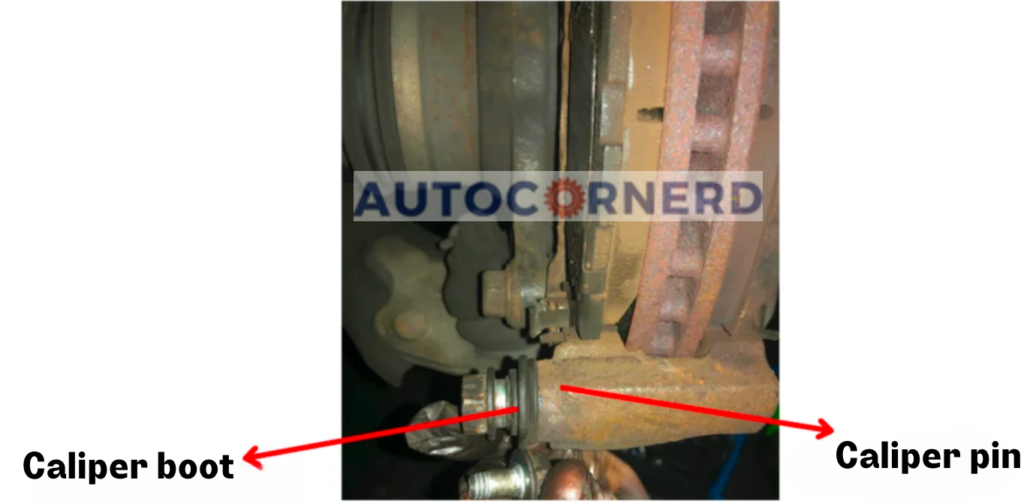
The brake pads connect to the caliper using small metal pins called caliper pins. These pins are coated with lubricants like grease or oil so they can slide easily without sticking.
If a caliper is sticking, that wheel’s brake will get hotter than the other wheels.
When the caliper pins get stuck, the brake pads can’t slide freely. This makes the loud grinding noise of metal on metal. The pads can’t press the rotor right when the pins don’t move.
Pins can get sticky from things like dirt or rust. Road salt and wetness can leave rust that stops pins from sliding well.
Rubber boots seal and protect the pins. If the boot cracks open, grease leaks out and dirt gets in. With oil, grease, or dirt inside, the pins won’t slide smoothly.
How to fix sticky brake caliper pins that are causing groaning noises?
Clean the brake caliper pins with a wire brush to remove dust, debris, and signs of rust. Once the caliper pins have been cleaned, apply a thin layer of lubricant to them. This will help ensure that the pins move freely and prevent them from sticking.
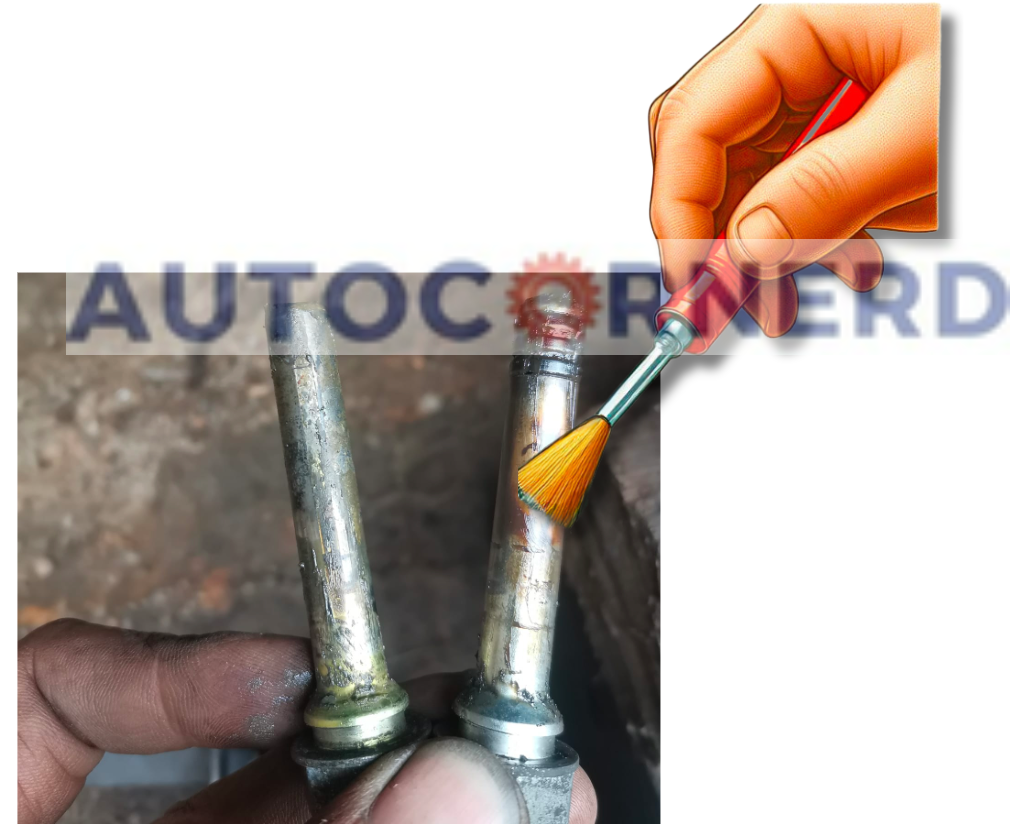
Note: Always use recommended silicone paste to lubricate the caliper pins. Furthermore, if too much lubricant is applied to the slide pins, air can be trapped at the end of the pin creating an “air spring”. This condition causes the caliper/pad assembly to drag on the rotor.
9. Corroded or Loose Bolts of Brake Calipers
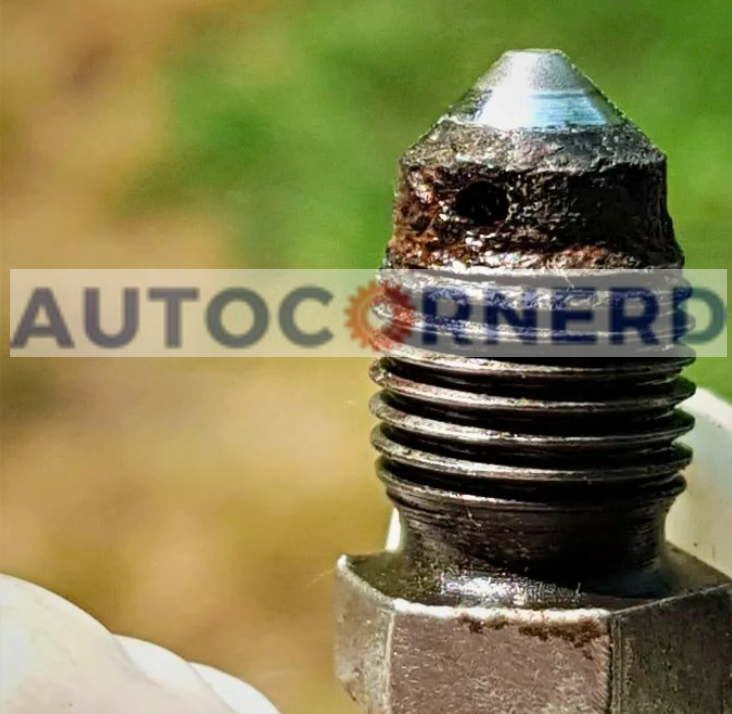
The brake calipers are connected to the wheels by a set of bolts, which can corrode or become loose over time.
Corroded or loose bolts can occur for several reasons. The most common is salt, dirt, and other environmental factors. They can cause the bolts to deteriorate, making them less stable. If the bolts become too loose, it can lead to the caliper rattling against the brake pad, causing a grinding noise.
How to fix corroded caliper bolts?
The only way to fix the problem is to replace the corroded bolts. It’s also important to make sure that the bolts are properly tightened according to the specifications (you should follow torque values of the bolts).
10. Bent Backing Plate
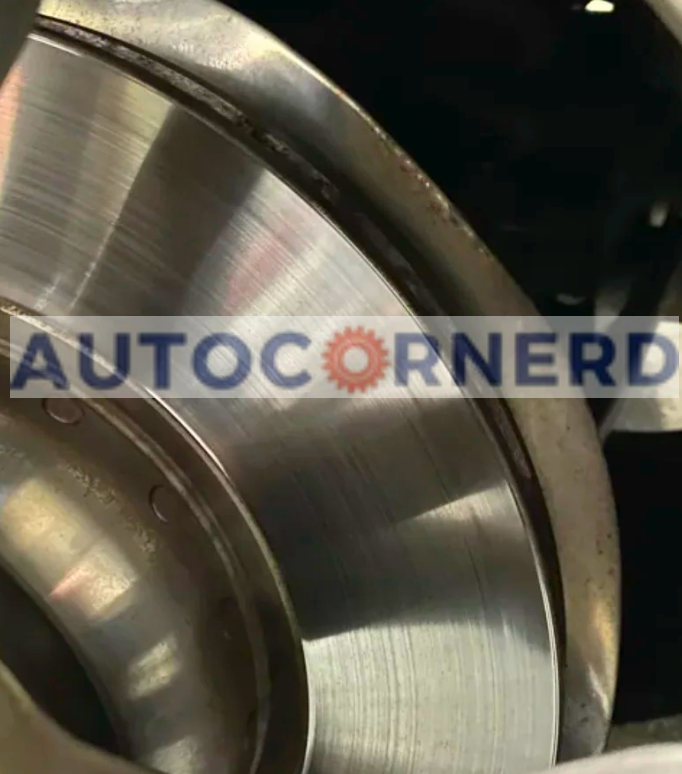
The metal plate behind brake rotors is called dust shield. It keeps dirt and water away from pads and rotors. Without this, pads and rotors can get damaged over time.
The front edge of dust shield is bent inwards. This funnels air onto the rotors to help cool the brakes. If bent too much, it will rub and grind against rotor.
To check for bent dust shield – Remove the brake caliper first. Look at the dust shield closely. A bent one will look out of shape. This is easy to see.
You can also test by pushing top and bottom of shield through wheel hole with a flat screwdriver. No need to remove it first.
11. Damaged Wheel Bearing
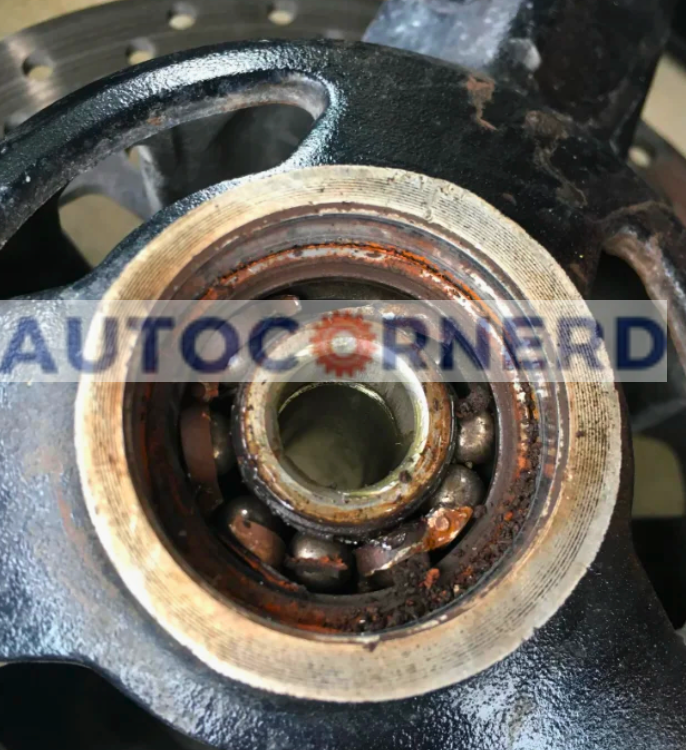
Wheel bearings are metal parts inside the wheel hub. They have steel balls or rollers fitting into an inner and outer race. Bearings help the wheel spin steady on the axle.
Wheel bearings get damaged from long use or hits to the wheel. This makes them worn out or not line up right. Then they grind when you brake.
The grinding sound happens because the steel balls rub each other when the bearing is damaged.
How to know your wheel bearings are bad?
With a damaged bearing, the car may pull to one side when braking. Or the steering wheel shakes when going fast. The balls need to spin free in the bearing. If not, it’s likely worn out.
What Steps Should I Take to Fix Grinding Noises When Braking?
When the brake pads grab the warped rotor, it makes a grinding sound. To confirm, look for rotor thickness variations while spinning the wheel or feel for pedal pulsations when braking. Resurfacing or replacing rotors is needed to resolve this.
Another culprit is dirt and debris stuck between pad and rotor, especially after off-road driving. Give it a good brake cleaning with rubber safe degreasers. Also inspect pad hardware like slides and caliper bolts for smooth movement. Lubricate and adjust parts as needed.
Overheated pads can become glazed and lose stopping power too. Light sanding and proper bedding in of new pads helps. Follow pad manufacturer bed-in procedures.
If upgraded to performance pads, improper bedding causes uneven transfer layer buildup between pad and rotor, resulting in noises. Properly bedding pads per guidelines is key.
Lastly, inspect wheel bearings by checking for play when tire is rocked top-bottom with brakes released. Damaged bearings can grind from internal wear. Replace bearings if worn or damaged.
Final Thoughts About Grinding Noise When Braking Despite Good Pads
In summary, the grinding sounds can happen even with good pads. This can be because of dirt buildup, worn rotor tabs, rust or scoring on rotors, glazing, improper bedding, noisy pad materials, wrong matching of parts, sticky calipers, loose bolts, bent shields, or bad wheel bearings.
Looking at the pads, rotors, calipers, wheels, shields and bearings can help find the issues. Cleaning the parts, putting in new parts wherever damaged, bedding the brakes correctly and using good quality materials can remove the noises.
Regular maintenance checks the health of the brakes. Fixing grinding noises quickly avoids safety risks and more damage to the brakes.
Some First Hand Experiences Shared By Users In Different Communities
Our team conducted research across various online communities, forums, and subreddits to gather user comments and opinions on “groaning and grinding noises when applying brakes”.
User 1 says:
Experienced the same in my Civic. I was surprised to find out it was due to warped rotors. The pads were in good condition, but the rotor surface wasn’t flat, causing the grinding noise.
User 2 says:
Encountered this in my Volvo XC40. Turns out, the issue was with the ABS system, not the pads. A sensor was giving incorrect readings, causing the ABS to engage unnecessarily and create a grinding sound.
User 3 says:
Experienced this in my Jeep Wrangler. It wasn’t the pads but the brake line. There was a small leak causing air to enter the system, leading to grinding noises during braking. A brake line repair sorted it out.
User 4 says:
Just had this issue with my Kia. Turns out, it was a small pebble stuck between the brake disc and the shield. Heard a grinding noise whenever I braked, but the pads were fine. Discovered the culprit during a routine tire rotation
